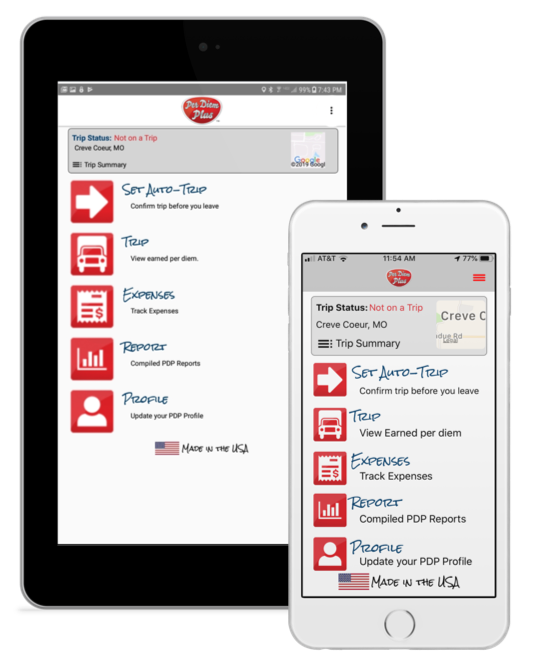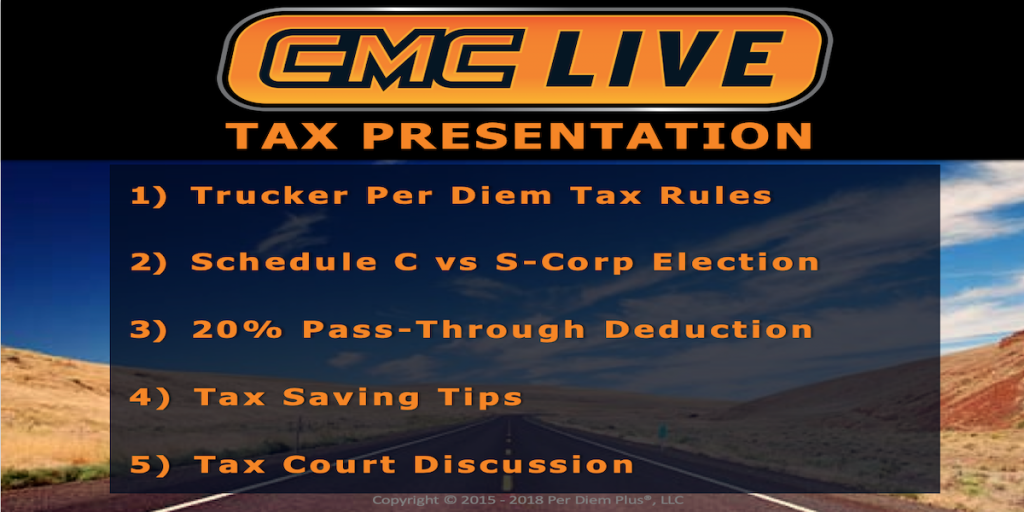PDP For Fleets - 3 Months Free
The following excerpt, "Paying your kids", is from "Making The IRS Work In Your Favor" presented by Mark W. Sullivan, EA at the 2018 CMC LIVE hosted by Kevin Rutherford and Let's Truck.

Trucking like any small business is often a family affair. My son started working in my accounting practice after school when he was 10 - shredding paper, stamping and stuffing envelopes. Whether you are a solo owner operator or run a trucking company, it is not uncommon to put your kids to work helping in the business. Here is what you need to know to take advantage of a great tax saving opportunity.
First and foremost: Your children must be bona fide employees
WARNING:
Sole Proprietorship / Partnerships
Children under 21 wages subject to income tax withholding, but not :
Corporations
Children under 21 are subject to:
In 2018 the standard deduction for SINGLE filers raised from $6,350 to $12,000.
|
Example: Employment Tax on Wages of $12,000 |
||
|
Sole-Proprietor |
Corporation |
|
| FICA / Medicare / FUTA 16.8% | $0.00 |
$2,016 |
Reference Material:
Refer to: https://www.irs.gov/businesses/small-businesses-self-employed/family-help
Start your 30-day FREE trial with no credit card required today!
Per Diem Plus is a proprietary mobile software application that was designed by truckers and built by tax pros. It is the only IRS-compliant mobile app that automatically tracks each qualifying day of travel in the USA & Canada and replaces ELD backups (logbooks) to substantiate away-from-home travel.
Mark is tax counsel for Per Diem Plus. With nearly two decades of experience advising trucking companies on per diem issues, Mark was responsible for defining the Per Diem Plus software logic rules that automatically calculates trucker per diem in accordance with IRS regulations. He also previously served as the consulting per diem tax expert for Omnitracs.
In addition to his time working with Per Diem Plus, Mark works in private practice as an Enrolled Agent at Mark Sullivan Consulting, PLLC specializing in federal tax controversy representation and consulting. He also served as the consulting and expert witness for the Federal Defenders Office and private defense counsel in financial crimes cases in multiple federal district courts. Contact Mark W. Sullivan, EA
Disclaimer
This article includes general tax information, and therefore may not be relied upon as legal authority. This means that the information cannot be used to support a legal argument in a court case. Please consult with a licensed tax professional.

Internal Revenue Code Section 199A generally provides a 20% passthrough deduction for qualified business income (QBI) derived from a sole proprietorship, partnership or S corporation that is a qualified trade or business, like a trucking business.
The 199A deduction is complicated! The estimated average annual burden hours per taxpayer is 2.5 hours, thus taxpayers are advised to seek professional tax guidance when calculating the deduction for their business.
The section 199A deduction is the lesser of:
WARNING: Section 199A deduction:
Qualified Business Income (QBI) is defined at Sec 199A(c) as the net amount of qualified items of income, gain, deduction, and loss for a tax year with respect to any qualified trade or business of the taxpayer.
Line 9 of the Form 1040 for 2018 (draft). IRS will be issuing new tax returns, worksheets and other tools to assist individuals and businesses with their deduction calculation and tax preparation. DOWNLOAD 2018 DRAFT F1040 101718
Small businesses with qualified income below:
Small business qualified income exceeds:
S-corporations and partnerships are generally not taxpayers and cannot take the deduction themselves. However, all S corporations and partnerships report each shareholder’s or partner’s share of QBI and W-2 wages on Schedule K-1 so the shareholders or partners may determine their deduction.
PDP Small Fleets requires users to complete the account setup HERE before using the app.
Mark is tax counsel for Per Diem Plus. With nearly two decades of experience advising trucking companies on per diem issues, Mark was responsible for defining the Per Diem Plus software logic rules that automatically calculates trucker per diem in accordance with IRS regulations. He also previously served as the consulting per diem tax expert for Omnitracs.
In addition to his time working with Per Diem Plus, Mark works in private practice as an Enrolled Agent at Mark Sullivan Consulting, PLLC specializing in federal tax controversy representation and consulting. He also served as the consulting and expert witness for the Federal Defenders Office and private defense counsel in financial crimes cases in multiple federal district courts. Contact Mark W. Sullivan, EA
Copyright 2018-2023 Mark Sullivan Consulting, PLLC; Per Diem Plus, LLC. Per Diem Plus proprietary software is the trademark of Per Diem Plus, LLC.®
Reference: 2017 Tax Cut & Job Act, Kenneth K. Wright (2018)
Disclaimer
This article includes information is not included in the Internal Revenue Bulletin 2018-64, and therefore may not be relied upon as legal authority. This means that the information cannot be used to support a legal argument in a court case.
The transportation workers’ special standard per diem rate has been increased to $66 from $63. For travel to Canada the rate increased from $68 to $71 per day.
The new rate becomes effective October 1, 2018.
Have questions about trucker per diem? Contact us at info@perdiemplus.com
Mark is tax counsel for Per Diem Plus. With nearly two decades of experience advising trucking companies on per diem issues, Mark was responsible for defining the Per Diem Plus software logic rules that automatically calculates trucker per diem in accordance with IRS regulations. He also previously served as the consulting per diem tax expert for Omnitracs.
In addition to his time working with Per Diem Plus, Mark works in private practice as an Enrolled Agent at Mark Sullivan Consulting, PLLC specializing in federal tax controversy representation and consulting. He also served as the consulting and expert witness for the Federal Defenders Office and private defense counsel in financial crimes cases in multiple federal district courts. Contact Mark W. Sullivan, EA

Presented by Mark W. Sullivan, EA - Tax Counsel for Per Diem Plus, LLC
Mark is tax counsel for Per Diem Plus. With nearly two decades of experience advising trucking companies on per diem issues, Mark was responsible for defining the Per Diem Plus software logic rules that automatically calculates trucker per diem in accordance with IRS regulations. He also previously served as the consulting per diem tax expert for Omnitracs.
In addition to his time working with Per Diem Plus, Mark works in private practice as an Enrolled Agent at Mark Sullivan Consulting, PLLC specializing in federal tax controversy representation and consulting. He also served as the consulting and expert witness for the Federal Defenders Office and private defense counsel in financial crimes cases in multiple federal district courts. Contact Mark W. Sullivan, EA
The following question was posted on Trucking With Authority Facebook Group,First impressions are that the existence of the IRS tax lien will be fatal to this trucking company and prohibit the securing of accounts receivable financing (commercial transactions financing agreement). However, the IRS is more interested in collecting unpaid taxes than putting companies out of business and has procedures for resolving tax lien issues.
The trucking company is seeking a commercial transaction financing agreement (factoring) in order to improve cash flow and insure liquidity and future tax compliance. However, the IRS filed a tax lien against the company prior to granting a monthly repayment (installment) agreement.
The appropriate action is to submit a Form 14434, Application for Certificate of Subordination of the Federal Tax Lien. In this case the factoring company will require the IRS subordinate the tax lien up to the amount of the factoring credit line, while also demanding proof that IRS has approved an installment agreement (Form 433-D) for the delinquent taxes.
Generally, these are loans to a taxpayer to operate a business. The creditor and the taxpayer, in the course of trade or business, agree that loans to the taxpayer will be secured by taxpayer’s commercial financing security. Security can include, but is not limited to, accounts receivable, mortgages on real property, and inventory.

"Can I use my dog as a tax deduction" is a common questioned posed to tax professionals by long-haul truckers. Every pet owner claims their animal is a member of the family and they are an essential companion for thousands of truckers.
It understandable that taxpayers may want to recoup some of their pet expenses with a creative medical expense tax deduction[i]. To counter the urge to claim Fido as a tax deduction the IRS has promulgated guidance on what type of animals qualify.
Keep In The Know: Biden's IRS Is Coming For Your PayPal & Venmo Payments
I found dozens of websites pitching “Service Animal” registration services while researching this article. All had variations on what disabilities qualified for the tax-deductible classification. My purpose is to analyze the tax implications and not to evaluate the merits of the service animal designation. Therefore, the below discussion (where applicable) uses definitions under the Americans With Disabilities Act (ADA).
Service Dog:
Under the ADA, a service animal is defined as a dog that has been individually trained to do work or perform tasks for an individual with a disability. The task(s) performed by the dog must be directly related to the person's disability.
Emotional Support Dog:
Emotional support, therapy, comfort, or companion animals are not considered service animals under the ADA. The types of emotional conditions that may require the assistance of an ESD are:
Guard Dog:
There is scant guidance on the deductibility of guard dogs, however, it is clear they do not meet the statutory requirement to qualify under Internal Revenue Code 213.
A review of IRC § 213 is required to answer the question, "Can I use my dog as a tax deduction?". The costs of buying, training, and maintaining a service animal to assist an individual with mental disabilities may qualify as medical care if the taxpayer can establish that the taxpayer is using the service animal primarily for medical care to alleviate a mental defect or illness and that the taxpayer would not have paid the expenses but for the disease or illness.
IRS Chief Counsel Note:
A taxpayer who claims that an expense of a peculiarly personal nature is primarily for medical care must establish that fact. The courts have looked toward objective factors to determine whether an otherwise personal expense is for medical care:
A personal expense is not deductible as medical care if the taxpayer would have paid the expense even in the absence of a medical condition. Commissioner v. Jacobs, 62 T.C. 813 (1974). [ii]
You can include in medical expenses
In general, this includes any costs, such as food, grooming, and veterinary care, incurred in maintaining the health and vitality of the service animal so that it may perform its duties.
Generally, you can deduct on Schedule A, Itemized Deductions (Form 1040) only the amount of your medical and dental expenses that is more than 7.5% of your adjusted gross income (AGI). However, with tax reform drastically increasing the Standard Deduction ($12,000 Single, $24,000 Married) most taxpayers will not have sufficient itemized deductions to warrant pursuing a tax break for their pet expenses.
The IRS does not offer a definition of a service dog, but guidance can be gleaned from the Americans With Disability Act (ADA). Under the ADA, a service animal is defined as a dog that has been individually trained to do work or perform tasks for an individual with a disability. The task(s) performed by the dog must be directly related to the person's disability.
The dog must be trained to take a specific action when needed to assist the person with a disability. For example, a person with diabetes may have a dog that is trained to alert him when his blood sugar reaches high or low levels. A person with depression may have a dog that is trained to remind her to take her medication. Or, a person who has epilepsy may have a dog that is trained to detect the onset of a seizure and then help the person remain safe during the seizure.
No. These terms are used to describe animals that provide comfort just by being with a person. Because they have not been trained to perform a specific job or task, they do not qualify as service animals under the ADA.
It depends. The ADA makes a distinction between psychiatric service animals and emotional support animals. If the dog has been trained to sense that an anxiety attack is about to happen and take a specific action to help avoid the attack or lessen its impact, that would qualify as a service animal. However, if the dog's mere presence provides comfort, that would not be considered a service animal under the ADA.
No. People with disabilities have the right to train the dog themselves and are not required to use a professional service dog training program.
Yes. The ADA does not restrict the type of dog breeds that can be service animals.
Can I use my dog as a tax deduction if it guards my truck? The absence of specific guidance on guard dogs from IRS compels a taxpayer to evaluate the appropriateness of claiming a tax deduction for expenses related to a guard dog used to protect a truck that is constantly on the move as opposed to a drop-yard or terminal. Kay Bell writing for Bankrate.com provided a great analysis,
“That “Beware of dog” sign in your business’s window is no idle threat. Break-ins have stopped since you set up a place for your Rottweiler to stay overnight. In this case, the IRS would likely be amenable to business deduction claims of the animal’s work-related expenses.
Standard business deduction rules still apply, notably that the cost of keeping an animal on work premises is ordinary and necessary in your line of business. Once you show that, the dollars spent each year keeping your pooch in good guard condition — food, vet bills and training — would be deductible as a business expense.
As with all deductions, be prepared to provide full and accurate records of your animal’s hours on the job. You’ll also find your tax claim more acceptable when you demonstrate how the animal protects your livelihood’s inventory. In addition, as is often the case with business property, the dog must be depreciated, a way of allocating its cost over its useful life for IRS purposes.
Keep in mind, too, that your claims carry more weight when your pet is a breed that’s typically used for such jobs. So even though your Chihuahua has a loud bark, your tax claim is more credible if your guard dog is a German shepherd, Doberman pinscher or a similar imposing breed”.[v]
Can I use my dog as a tax deduction? Maybe. Every pet owner claims their animal is a member of the family and an essential companion for thousands of long-haul truckers. The IRS disagrees. It understandable that taxpayers may want to recoup some of their pet expenses with a tax deduction, but with the overall value of the deduction is limited due to the 7.5% of AGI offsetting most expenses. Furthermore, extensive rules have been promulgated to insure only qualifying animal expenses can be deducted and taxpayers risk the wrath of the IRS if they get too creative interpreting those regulations.
Available as a $7.99 monthly subscription on App Store and Google Play
Per Diem Plus is a proprietary mobile software application that was designed by truckers and built by tax pros. It is the only IRS-compliant mobile app that automatically tracks each qualifying day of travel in the USA & Canada and replaces ELD backups (logbooks) to substantiate away-from-home travel.
Mark is tax counsel for Per Diem Plus. With nearly two decades of experience advising trucking companies on per diem issues, Mark was responsible for defining the Per Diem Plus software logic rules that automatically calculates trucker per diem in accordance with IRS regulations. He also previously served as the consulting per diem tax expert for Omnitracs.
In addition to his time working with Per Diem Plus, Mark works in private practice as an Enrolled Agent at Mark Sullivan Consulting, PLLC specializing in federal tax controversy representation and consulting. He also served as the consulting and expert witness for the Federal Defenders Office and private defense counsel in financial crimes cases in multiple federal district courts. Contact Mark W. Sullivan, EA
Please remember that everyone’s financial situation is different. This article does not give and is not intended to give specific accounting and/or tax advice. Please consult your own tax or accounting professional.
Copyright 2018-2022 Per Diem Plus. Per Diem Plus is the trademark of Per Diem Plus, LLC
[i] 2014 American Pet Producers Association market study
[ii] https://www.irs.gov/pub/irs-wd/10-0129.pdf
[iii] https://www.irs.gov/pub/irs-pdf/p502.pdf
[iv] https://esadoctors.com/esa-letter-service-dog-certification/
[v] https://www.bankrate.com/finance/taxes/tax-write-offs-for-pet-owners-1.aspx#slide=3

The following article is summary of the impact of the 2017 Tax Cuts and Job Act (TCJA) on truckers The following is a list of common trucker tax deductions that were changed by the TCJA (except where noted).
The TCJA eliminated itemized deductions for employee drivers, which includes all unreimbursed employee business expenses. The following is a non-exhaustive list:
This provision does not apply to Owner Operators who claim travel-related and business expenses on Schedule C or Form 1120S.
IRC Section 199A generally provides a deduction of 20% of qualified business income (QBI) derived from a sole proprietorship, partnerships, or S corporation that is a qualified trade or business. The §199A deduction is taken from adjusted gross income (AGI) in determining taxable income and therefore does not reduce self-employment income. See my article titled "Understanding the 20% Passthrough Deduction" for a detailed discussion of the complicated deduction.
The §199A deduction is complicated and will require significant guidance from the IRS.
The deduction for alimony and separate maintenance payments by the payor is repealed. The payee (recipient) will not be required to include such payments in gross income for divorce or separation instruments executed after December 31, 2018.[i]
Medical expenses continue to be deductible to the extent they exceed 7.5% of adjusted gross income (AGI) for 2017 and 2018. For years after 2018 the threshold is 10% of AGI.
The moving expense deduction is repealed except for members of the Armed Forces. The exclusion from gross income and FICA wages for employer reimbursed moving expenses is repealed other than members of the Armed Forces.
This provision does not apply to Owner Operators who claim expenses related to moving a business operation on Schedule C or Form 1120S.
A taxpayer may claim an itemized deduction of up to $10,000 ($5,000 for married filing separately) for the aggregate of (1) state and local property taxes not paid or accrued in carrying on a trade or business (See IRC Sec. 212), and (2) state and local income taxes (or sales taxes in lieu of income taxes) paid or accrued in the tax year[ii].
This provision does not apply to Owner Operators who claim business-related taxes on Schedule C or Form 1120S.
The deduction for interest on home equity indebtedness is disallowed and applies to existing home equity loans. Home equity loans used for business or substantial improvement of a residence may still be deductible[iii]; any used for personal or investment purposes are not[iv].
The base for cash contributions is increased from 50% to 60%. No deduction is allowed for payments to colleges and universities in exchange for rights to purchase athletic seats.
All gambling expenses are now subject to the gambling winnings limitation and not just wagers. Schedule A filers can still deduct gambling losses to the extent of winnings but must have total itemized deductions exceeding the increased standard deductions.
The individual tax for failure to maintain minimum essential coverage is reduced to zero with respect to health coverage status for months beginning after December 31, 2018.
The standard deduction is increased to $24,000 for married filing jointly, $18,000 for head of household, and $12,000 for unmarried (single). The pre-2018 additional $1,250 standard deduction for taxpayers over age 65 or who are blind are retained.
Personal exemptions and dependency deductions are repealed. The IRS is examining how the definition of qualifying relative should be addressed.
Section 6695(g) of the internal Revenue Code requires paid return preparers to satisfy due diligence requirements to ensure clients qualify for the American opportunity credit, lifetime learning credit, earned income credit, and child tax credit.
PDP Small Fleets requires users to complete the account setup HERE before using the app.
Mark is tax counsel for Per Diem Plus. With nearly two decades of experience advising trucking companies on per diem issues, Mark was responsible for defining the Per Diem Plus software logic rules that automatically calculates trucker per diem in accordance with IRS regulations. He also previously served as the consulting per diem tax expert for Omnitracs.
In addition to his time working with Per Diem Plus, Mark works in private practice as an Enrolled Agent at Mark Sullivan Consulting, PLLC specializing in federal tax controversy representation and consulting. He also served as the consulting and expert witness for the Federal Defenders Office and private defense counsel in financial crimes cases in multiple federal district courts. Contact Mark W. Sullivan, EA
Disclaimer: This article is for information purposes only and cannot be cited as precedent or relied upon in a tax dispute before the IRS.
Copyright 2018-2023 Mark Sullivan Consulting, PLLC; Per Diem Plus, LLC. Per Diem Plus proprietary software is the trademark of Per Diem Plus, LLC.®
[i] Notice 2018-37, 2018-18, I.R.B. 521
[ii] IRC § 164(b)(6) (flush language)
[iii] Temp. Reg. § 1.163-8T
[iv] Refer to Publication 936 (2017) Home Mortgage Interest Deduction for definitions of “substantial improvement”

“If I have two different home addresses can I claim per diem while off duty at either location? And can I claim per diem for off days spent visiting my wife in Oregon”
Can a truck driver have two tax homes? Bill is an OTR trucker who claims Las Vegas, Nevada as his tax home:
Whether his tax home is Nevada or Oregon and whether the Las Vegas home is indeed his permanent residence for per diem purposes are factual questions resolved by the fact:
As this example demonstrates, per diem issues can be complicated. It would be allowed for a driver who is away from home undergoing a 34-hour restart while in transit between a shipper and consignee, but not if the restart is done at home. Although, Bill claims Las Vegas, Nevada as his tax home, the facts dictate that Oregon is his tax home in a real and substantial sense, thus he does not qualify for per diem while visiting his wife. Additionally, attempting to claim per diem for every day he was away from his Las Vegas home - 365 days in this case - would be a red flag to IRS for audit.
PDP Small Fleets requires users to complete the account setup HERE before using the app.
Mark is tax counsel for Per Diem Plus. With nearly two decades of experience advising trucking companies on per diem issues, Mark was responsible for defining the Per Diem Plus software logic rules that automatically calculates trucker per diem in accordance with IRS regulations. He also previously served as the consulting per diem tax expert for Omnitracs.
In addition to his time working with Per Diem Plus, Mark works in private practice as an Enrolled Agent at Mark Sullivan Consulting, PLLC specializing in federal tax controversy representation and consulting. He also served as the consulting and expert witness for the Federal Defenders Office and private defense counsel in financial crimes cases in multiple federal district courts. Contact Mark W. Sullivan, EA
Disclaimer: This article is for information purposes only and cannot be cited as precedent or relied upon in a tax dispute before the IRS.
Copyright 2023 Mark Sullivan Consulting, PLLC; Per Diem Plus, LLC. Per Diem Plus proprietary software is the trademark of Per Diem Plus, LLC.®

Novel tax defenses won't work with the Internal Revenue Service. The law allows as a deduction for all the ordinary and necessary expenses paid or incurred during the taxable year in carrying on any trade or business. This include expenses for traveling while away from home[i]. Since the average OTR truck driver is away from home 250 nights a year and accumulates hundreds of receipts, it is tempting to inflate tax deductible travel and business expenses to minimize taxes.
Billy was a self-employed truck driver subject to DOT hours of service regulations who was entitled to claim meals per diem and other business expenses as a tax deduction[ii]. However, for the tax year under audit he also claimed hometown meals and provided the IRS with a novel defense.
Billy's novel defense:
No. The novel tax defenses did not persuade the U.S. Tax Court:
As this case demonstrates novel theories for tax deductible items will not survive scrutiny in a tax audit. The unique nature of the trucking industry compels drivers to exercise due diligence when assembling tax records and reviewing the tax return lest you end up like Billy.
Available as a $7.99 monthly subscription on Google Play or App Store
Per Diem Plus is a proprietary mobile software application that was designed by truckers and built by tax pros. It is the only IRS-compliant mobile app that automatically tracks each qualifying day of travel in the USA & Canada and replaces ELD backups (logbooks) to substantiate away-from-home travel.
Mark is tax counsel for Per Diem Plus. With nearly two decades of experience advising trucking companies on per diem issues, Mark was responsible for defining the Per Diem Plus software logic rules that automatically calculates trucker per diem in accordance with IRS regulations. He also previously served as the consulting per diem tax expert for Omnitracs.
In addition to his time working with Per Diem Plus, Mark works in private practice as an Enrolled Agent at Mark Sullivan Consulting, PLLC specializing in federal tax controversy representation and consulting. He also served as the consulting and expert witness for the Federal Defenders Office and private defense counsel in financial crimes cases in multiple federal district courts. Contact Mark W. Sullivan, EA
Copyright 2022 Per Diem Plus, LLC. All rights reserved.

If you are an OTR truck driver who lives in the truck you may be a classified a "tax turtle" by IRS and unable to claim travel-related expenses.
There are frequent posts on trucker social media forums and even in trucking publications that suggest merely having a post office box will be sufficient to meet the IRS’ regulations for claiming travel-related expenses.
John was an OTR truck driver who for the year under audit was away from home for 358 days, exceeded the PO Box requirements and claimed to live with his mother[iii].
Whether John had a tax home and whether his mother’s house was indeed his permanent residence were factual questions:
John was a “tax turtle” who was not entitled to claim per diem and travel-related expenses.
As this case demonstrates the PO Box gambit will not survive scrutiny in a tax audit. For a self-employed truck who lives in their truck to claim travel-related expenses, like per diem, some amount of expenses must be incurred at your declared tax home. It would also be wise to spend some time there lest you risk being classified a “tax turtle”.
PDP Small Fleets requires users to complete the account setup HERE before using the app.
Mark is tax counsel for Per Diem Plus. With nearly two decades of experience advising trucking companies on per diem issues, Mark was responsible for defining the Per Diem Plus software logic rules that automatically calculates trucker per diem in accordance with IRS regulations. He also previously served as the consulting per diem tax expert for Omnitracs.
In addition to his time working with Per Diem Plus, Mark works in private practice as an Enrolled Agent at Mark Sullivan Consulting, PLLC specializing in federal tax controversy representation and consulting. He also served as the consulting and expert witness for the Federal Defenders Office and private defense counsel in financial crimes cases in multiple federal district courts. Contact Mark W. Sullivan, EA
Disclaimer: This article is for information purposes only and cannot be cited as precedent or relied upon in a tax dispute before the IRS.
Copyright 2018-2023 Mark Sullivan Consulting, PLLC; Per Diem Plus, LLC. Per Diem Plus proprietary software is the trademark of Per Diem Plus, LLC.®
[i] IRS Rev. Proc. 2011-47 (most recently superseded by 2017-42) & IRC 162(a)(2); Reg 1.162-2) A tax deduction is allowed for ordinary and necessary traveling expenses incurred by a taxpayer while away from home in the conduct of a trade or business. A truck driver is not away from home unless his or her duties require the individual to be away from the general area of his or her tax home for a period substantially longer than an ordinary workday and it is reasonable to need rest or sleep.
[ii] Rev. Ruling 75-432
[iii] HATEM ELSAYED, Petitioner v. COMMISSIONER OF INTERNAL REVENUE, Respondent Docket No. 8935-07S. Filed May 26, 2009
